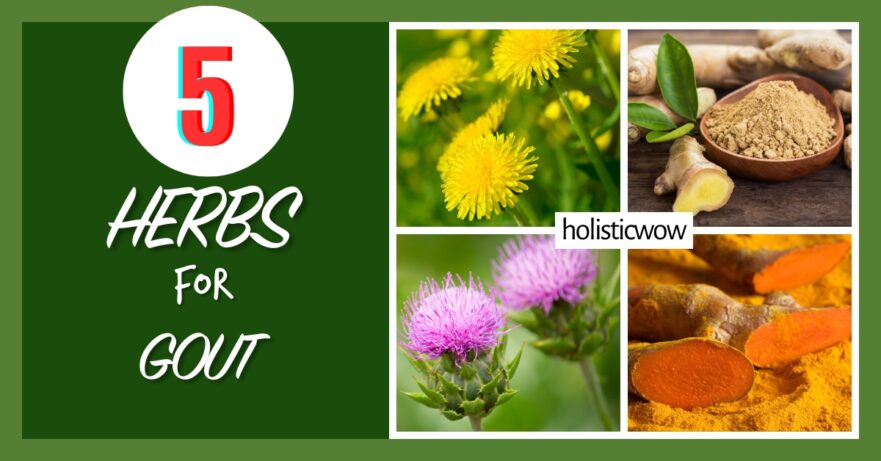In this article about herbs for gout:
🌿 Best Herbs for Gout | 📜 Herbal Preparations and Recipes for Gout | ☯️ Integrating Herbs into Daily Life for Gout Management | 🌱 Navigating Herbs Safely
A gout is a painful form of arthritis caused by high uric acid levels in the blood. It typically affects joints, especially the big toe, causing intense pain, swelling, and redness. Gout attacks can be debilitating and significantly impact daily life.
Several herbs offer potential benefits for managing gout symptoms. Ginger, dandelion, and nettle have anti-inflammatory properties that may help reduce pain and swelling. Turmeric and milk thistle support liver function, potentially aiding uric acid metabolism and excretion.
These herbs can be consumed as teas, supplements, or incorporated into meals. However, it’s crucial to consult a healthcare provider before using herbal remedies, especially if you’re taking medications or have underlying health conditions.
Key Takeaways
- 🫚 Ginger’s anti-inflammatory power: Ginger has anti-inflammatory properties that may help reduce pain and inflammation associated with gout attacks, though more studies are needed to confirm its effects specifically on gout.
- ✨ Turmeric’s curcumin benefits: Turmeric’s active compound, curcumin, may help reduce gout-related inflammation by inhibiting inflammatory pathways, but its impact on uric acid levels is not yet conclusively proven.
- 🌿 Nettle’s diuretic effect: Nettle acts as a diuretic, potentially aiding in increased urine production, which may help eliminate excess uric acid, though more research is needed to confirm its effectiveness for gout management.
- 🌱 Dandelion’s liver support: Dandelion may support liver function and act as a mild diuretic, which could help the body manage uric acid levels, although more research is needed on its direct effects on gout.
- 🌺 Milk thistle’s liver benefits: Milk thistle supports liver health, which is crucial for processing and eliminating toxins, including uric acid, but it has not been directly linked to reducing gout symptoms.
🌿 Best Herbs for Gout
A gout is a form of arthritis characterized by sudden, severe attacks of pain, swelling, redness, and tenderness in joints, often starting in the big toe. It occurs when elevated uric acid levels build up in the blood and form sharp crystals in a joint. Symptoms typically include intense joint pain, lingering discomfort, inflammation, and limited range of motion.
The condition is caused by an excess of uric acid in the body, resulting from a diet high in purines, certain medical conditions, or the body’s inability to eliminate uric acid efficiently. Gout attacks can be triggered by factors such as consuming alcohol, eating purine-rich foods, or experiencing dehydration.
Several herbs have been traditionally used to support the management of gout symptoms and promote overall joint health. These include ginger (Zingiber officinale), dandelion (Taraxacum officinale), nettle (Urtica dioica), turmeric (Curcuma longa), and milk thistle (Silybum marianum). These herbs offer various anti-inflammatory and antioxidant properties that may help alleviate gout symptoms and support the body’s natural processes.
Ginger (Zingiber officinale)
Ginger (Zingiber officinale) has long been valued in traditional medicine for its anti-inflammatory and antioxidant properties. The active compounds in ginger, such as gingerols and shogaols, may help reduce inflammation, easing the pain and swelling associated with gout. Gout occurs when uric acid builds up in the joints, leading to painful flare-ups. Studies on hyperuricemic models suggest that ginger may lower uric acid levels and reduce inflammation, but more human research is needed to confirm its effectiveness in preventing gout attacks [1]. Additionally, research has shown that ginger compresses can be effective in reducing pain for those with gout arthritis, offering a non-drug approach to pain relief [2]. Regular use of ginger in tea, cooking, or as a supplement may help manage gout symptoms, but more studies are needed to confirm its effectiveness in preventing flare-ups.
Dandelion (Taraxacum officinale)
Dandelion (Taraxacum officinale) has been used for centuries for its medicinal properties, particularly as a diuretic and for liver support. Its ability to increase urine production may help flush excess uric acid from the body, potentially making it beneficial for managing gout. Research suggests that dandelion extract may reduce uric acid levels by promoting uric acid excretion and inhibiting xanthine oxidase, an enzyme involved in uric acid production. Studies have shown that dandelion extract significantly lowers blood uric acid levels and increases uric acid excretion without affecting liver or kidney function [3]. While more research is needed to confirm these effects in humans, dandelion may support managing gout and promoting kidney and liver health when consumed as tea or supplements.
Nettle (Urtica dioica)
Nettle (Urtica dioica) has a long history of use in traditional medicine for its anti-inflammatory and mild diuretic properties, which may help manage gout symptoms. Research suggests that nettle contains compounds with anti-inflammatory effects that may help reduce pain and swelling during gout attacks by blocking a protein called NF-κB, which is involved in causing inflammation in the body [4]. Its diuretic effect may support the elimination of excess uric acid by increasing urine production. Additionally, recent research has found that nettle contains natural compounds, like apigenin-7-O-glucoside and kaempferol, which may help lower uric acid levels and reduce inflammation. This means that nettle could work in different ways to manage gout, making it a promising option for future treatments [5]. However, more studies are needed to confirm its effectiveness in uric acid management in gout.
Turmeric (Curcuma longa)
Turmeric (Curcuma longa) has been used in cooking and traditional medicine for thousands of years, particularly in India. Its active compound, curcumin, is well-known for its anti-inflammatory and antioxidant properties. These effects may help reduce the pain and swelling from gout attacks. Curcumin blocks inflammatory chemicals like COX-2 and TNF-α, which play a key role in inflammation [6]. Some research suggests curcumin may help lower uric acid levels by inhibiting xanthine oxidase, an enzyme involved in uric acid production, and by promoting its excretion. However, not all studies showed a significant reduction in uric acid levels, and more human research is needed to confirm its effectiveness for gout [7]. Incorporating turmeric into your diet or taking it as a supplement may help manage gout symptoms, but further research is necessary to understand how well it works to reduce the frequency of gout attacks.
Milk thistle (Silybum marianum)
Milk thistle (Silybum marianum) has been used for over 2,000 years for its liver-protective properties. While it’s not directly used for treating gout, its liver benefits may help indirectly manage gout. The liver plays a key role in processing and eliminating toxins, including uric acid, which is associated with gout. Milk thistle’s active compound, silymarin, protects liver cells from damage and supports liver function. By promoting liver health, milk thistle may help the body better regulate uric acid, although there is no direct evidence that it specifically affects uric acid metabolism in gout patients. Additionally, silymarin has anti-inflammatory properties that may help with general inflammation by blocking key pathways in the body that trigger inflammation. However, its specific effects on inflammation caused by gout haven’t been studied much yet [8]. More research is needed to explore these potential benefits for gout.
📜 Herbal Preparations and Recipes for Gout
Herbal remedies have been used for centuries to help manage various health conditions, including gout. By harnessing the natural anti-inflammatory, diuretic, and detoxifying properties of certain herbs, these preparations may complement conventional treatments for gout. The following herbal tea blends support your body’s natural ability to reduce inflammation, promote uric acid excretion, and protect liver health. Always consult a healthcare provider before starting any new herbal regimen, particularly if you have existing health conditions or are taking medications.
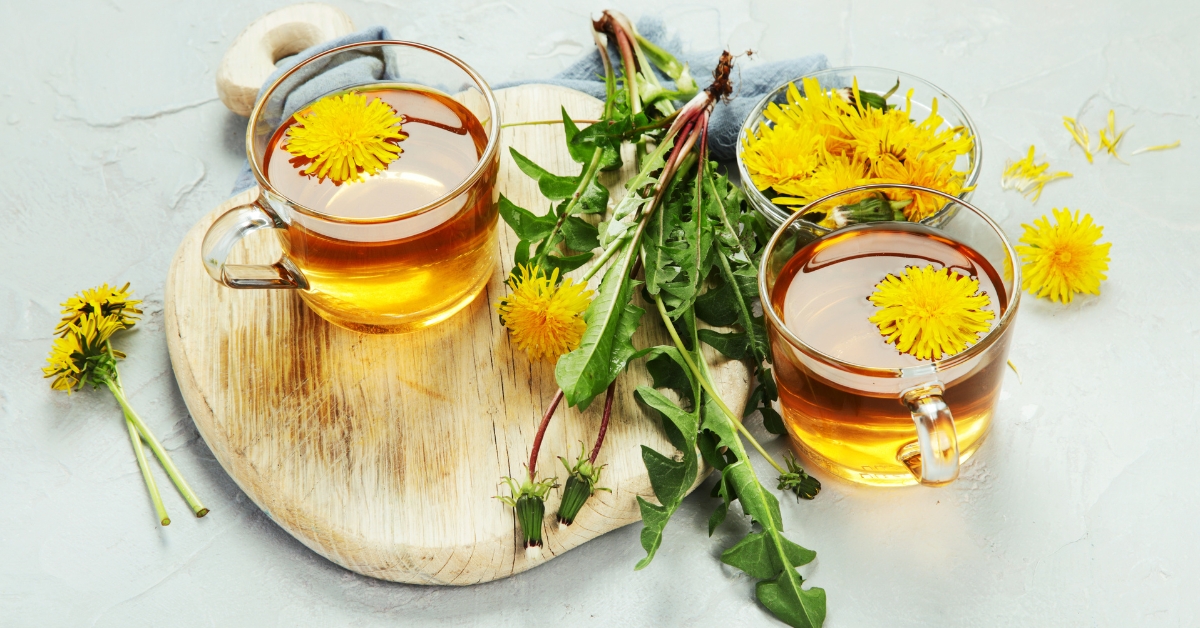
Gentle Ginger-Dandelion Tea
Ingredients:
- 1 teaspoon dried dandelion leaf
- ½ teaspoon dried ginger root
- 1 cup of boiling water
Preparation:
- Combine herbs in a teapot.
- Add boiling water and steep for 10 minutes.
- Strain and drink 1-2 cups daily.
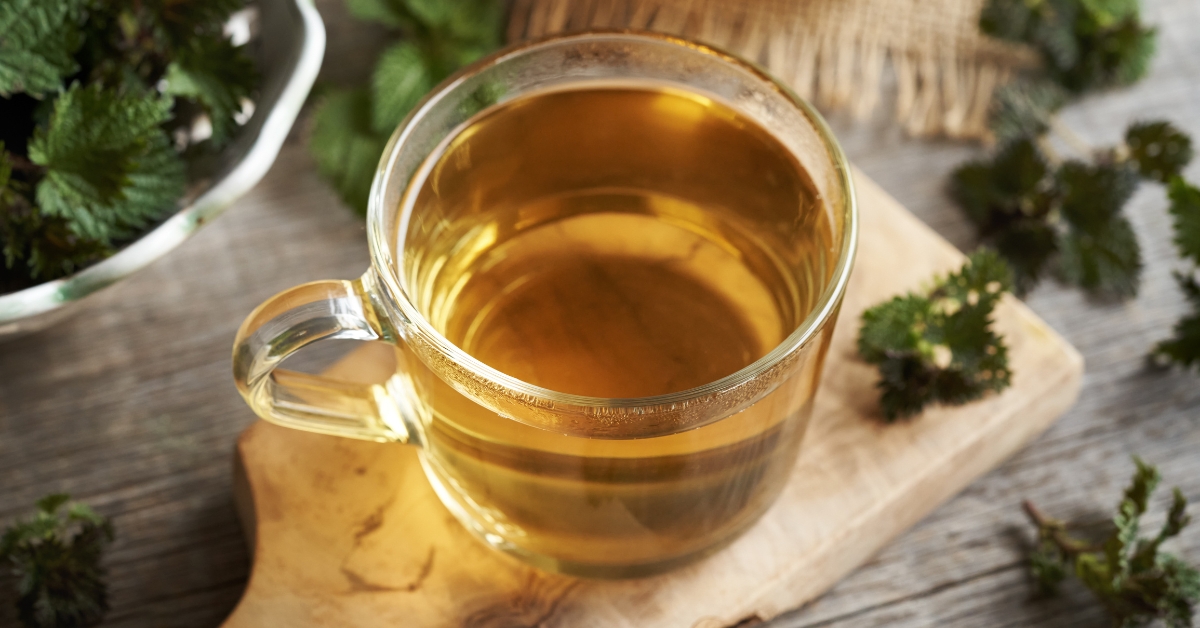
Nettle-Turmeric Infusion
Ingredients:
- 1 teaspoon dried nettle leaf
- ½ teaspoon ground turmeric
- ½ teaspoon dried ginger root
- 1 cup of boiling water
Preparation:
- Mix herbs in a mug.
- Pour boiling water over them and steep for 15 minutes.
- Strain and drink 1 cup twice daily.
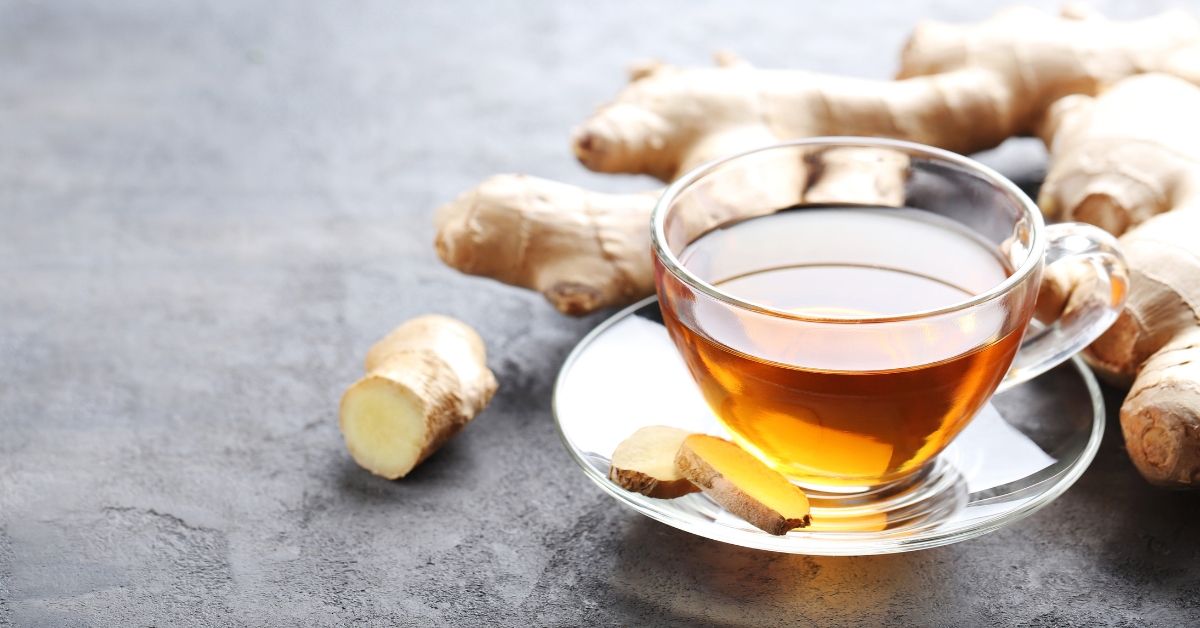
Triple Root Gout Relief Tea
Ingredients:
- 1 teaspoon dried dandelion root
- ½ teaspoon dried ginger root
- ½ teaspoon dried turmeric root
- 1 cup of boiling water
Preparation:
- Combine roots in a teapot.
- Add boiling water and steep for 15 minutes.
- Strain and drink 1 cup three times daily.
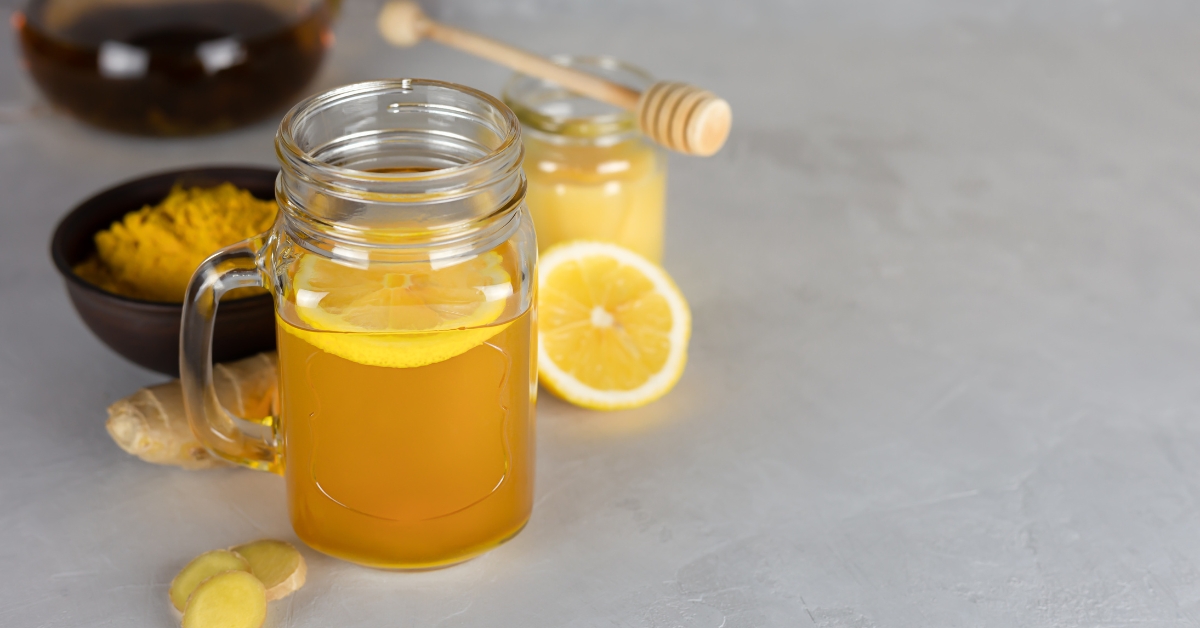
Comprehensive Gout Support Blend
Ingredients:
- 1 teaspoon dried nettle leaf
- 1 teaspoon dried dandelion root
- ½ teaspoon dried ginger root
- ½ teaspoon ground turmeric
- ¼ teaspoon milk thistle seeds (crushed)
- 1 cup of boiling water
Preparation:
- Mix all herbs in a teapot.
- Add boiling water and steep for 20 minutes.
- Strain and drink 1 cup twice daily.
These herbal blends are designed to support gout management through their anti-inflammatory, diuretic, and liver-supporting properties. However, none of the blends are a replacement for conventional medical treatment. Always consult a healthcare provider before starting any new herbal regimen, particularly if you have existing health conditions or are taking medications.
☯️ Integrating Herbs into Daily Life for Gout Management
Incorporating herbs into your daily routine may help manage gout symptoms and support overall joint health. Here are some practical tips for using herbs and complementary practices to maximize their potential benefits.
Daily Use and Lifestyle Integration
- 🫖 Herbal Teas: Start your day with a cup of Gentle Ginger-Dandelion Tea or the Comprehensive Gout Support Blend. These blends may help manage inflammation and support liver health, which can indirectly aid in managing gout symptoms. Consider having another cup in the afternoon or evening.
- 💚 Herbal Supplements: If you prefer not to drink herbal teas, consider taking herbs like ginger, turmeric, or nettle in capsule or tincture form. These can be easily incorporated into your daily supplement routine. However, be mindful of dosages, particularly for turmeric and ginger, which can interact with medications like blood thinners.
- 🥤 Culinary Herbs: Incorporate ginger and turmeric into your cooking. Add fresh ginger to stir-fries or smoothies, and use turmeric in curries or golden milk lattes. Turmeric needs to be combined with black pepper or a fat source for better absorption of its active compound, curcumin.
Additional Practices to Support Gout Management
- 🍏 Dietary Adjustments: Alongside herbal remedies, focus on a diet low in purines. Increase your intake of cherries and celery, which may help lower uric acid levels. Research suggests that cherry juice may reduce the frequency of gout attacks, though more studies are needed to confirm these effects.
- 🫗 Hydration: Drink plenty of water throughout the day to help flush out uric acid. You can infuse your water with nettle leaves or add a splash of cherry juice for added benefits. While nettle may offer some diuretic effects, cherry juice has more established evidence for reducing gout attacks.
- 🏃♀️ Regular Exercise: Engage in low-impact exercises like swimming or cycling to maintain joint health without putting excess stress on affected areas. Exercise can also help manage weight, an important factor in reducing gout attacks.
- 🧘♀️ Stress Management: Practice relaxation techniques such as deep breathing or meditation. While not directly linked to gout, managing stress can reduce inflammation and improve general well-being.
- 💦 Foot Soaks: Consider occasional foot soaks with Epsom salts for soothing sore joints.
Remember to start with smaller doses of herbs to see how your body reacts. Herbs can be beneficial but should complement, not replace, conventional gout treatments. Always consult a healthcare provider, especially if you take medications or have preexisting health conditions.
🌱 Navigating Herbs Safely
Starting with small doses is the first step when adding herbal remedies to your health routine. This approach lets you see how you respond and adjust amounts for the best effect, keeping safety in mind. While many herbs are safe, everyone’s body reacts differently. If you notice any side effects, it’s important to stop and think about what might be causing them.
Remember, herbs can sometimes interact with prescription medicines. These interactions might make your medicines work too well or not well enough, so talking to a healthcare provider or an herbalist is essential. This is especially crucial if you’re pregnant, breastfeeding, taking medications regularly, or have an existing health condition. Getting advice tailored to your situation can help you avoid any unnecessary risks.
For kids and older adults, being extra careful with herbs is important. Their bodies might react more strongly to herbal remedies, and the chance of side effects or interactions could be greater. Before giving herbal treatments to children or elderly family members, getting advice from a professional is a must to ensure their safety.
By being cautious and seeking expert advice when needed, you can make herbal remedies a safe part of your wellness plan. This careful approach allows you to enjoy the benefits of herbs while keeping yourself and your family safe.
We explored the potential benefits of herbal remedies for managing gout symptoms and supporting overall joint health. Gout, a form of arthritis characterized by sudden, severe joint pain and inflammation, is caused by high uric acid levels in the blood. We discussed several herbs that may help address gout symptoms.
Ginger, dandelion, nettle, turmeric, and milk thistle are highlighted for their anti-inflammatory, diuretic, and liver-supporting properties. While some studies suggest these herbs may help lower uric acid levels or reduce inflammation, more research is needed to confirm their effectiveness in treating gout.
We provided recipes for herbal tea blends designed to support gout management, ranging from mild to more potent combinations. These blends incorporate various combinations of the discussed herbs.
Practical tips for integrating herbs into daily life include drinking herbal teas, taking supplements, and using culinary herbs in cooking. Additional lifestyle practices to support gout management are also important, such as dietary adjustments, staying hydrated, regular exercise, and stress management.
It’s important to note that while herbs may offer potential benefits, they should be used as a complement to, not a replacement for, conventional gout treatments. Always consult a healthcare provider before starting any new herbal regimen, especially if you have existing health conditions or are taking medications.
FAQ
What are the most effective herbs for managing gout symptoms?
Several herbs may help manage gout symptoms and support overall joint health. Research indicates ginger has anti-inflammatory properties that may help reduce pain and swelling associated with gout attacks. Some studies have demonstrated ginger's potential for reducing inflammation, but more human trials related to gout are needed.
Turmeric is another herb that shows promise for its anti-inflammatory effects. Its active compound, curcumin, has been shown to inhibit inflammatory pathways in the body, which is involved in the inflammation process. However, while turmeric may help with general inflammation, more studies are required to confirm its direct impact on gout-related inflammation.
Nettle is often used for its diuretic and anti-inflammatory properties, which may support the elimination of excess uric acid and help reduce joint pain. However, its ability to specifically reduce uric acid levels in humans needs more research. Current evidence for nettle’s diuretic effect is based on traditional use and limited studies.
Dandelion supports liver function and acts as a diuretic, potentially aiding uric acid excretion. However, there is little direct clinical evidence linking dandelion to improved uric acid metabolism in humans.
Milk thistle is not directly related to gout treatment but may support liver health, which is crucial for proper uric acid metabolism. More research is needed to confirm its role in managing gout symptoms.
While these herbs show potential, it’s important to note that more research is required to fully understand their effectiveness in treating gout. Always consult a healthcare provider before starting any herbal regimen for gout management.
How can I incorporate herbs into my daily routine to manage gout?
Incorporating herbs into your daily routine for gout management may offer supportive benefits, although it should complement conventional treatments. Start your day with a cup of ginger tea. Ginger has anti-inflammatory properties that may help reduce inflammation associated with gout. However, while ginger shows promise, more studies are needed to confirm its specific effects on gout.
Throughout the day, sip on nettle tea that may support kidney function and promote uric acid excretion, though direct evidence in humans is limited. For a midday boost, try a turmeric latte or golden milk, which may provide anti-inflammatory benefits due to curcumin, the active compound in turmeric. It’s important to note that turmeric is best absorbed when consumed with black pepper or fat. Use ginger and turmeric liberally in stir-fries, soups, and curries in your cooking.
Consider taking a dandelion supplement or drinking dandelion tea in the evening to support liver function, as dandelion has traditionally been used for liver health. While there is no direct evidence linking dandelion to uric acid reduction in gout, its diuretic properties may help indirectly.
For those who prefer supplements, a combination of ginger, turmeric, and nettle capsules may be taken with meals. However, consult your healthcare provider before starting any new supplement regimen, mainly if you are on medications such as blood thinners, as ginger and turmeric may interact with them.
Proper hydration is crucial for flushing out uric acid. You can enhance your water by infusing it with fresh ginger or adding a splash of cherry juice. Some studies suggest that cherry juice may reduce the frequency of gout attacks, though more research is needed to confirm this.
Consistency is key when using herbs for gout management, so try to incorporate these practices into your daily routine for the best results.
Are there any potential side effects or interactions when using herbs for gout?
While herbs can be beneficial for managing gout symptoms, it's important to be aware of potential side effects and interactions. Ginger is generally safe but may increase the risk of bleeding, especially at high doses or in individuals taking blood thinners such as warfarin or aspirin. Avoiding large doses of ginger if you're on blood-thinning medication is recommended.
Turmeric may interact with certain medications, including blood thinners, diabetes medications, and acid-reducing drugs. In people on blood thinners, turmeric could increase bleeding risk due to its mild blood-thinning properties. Additionally, turmeric may lower blood sugar levels, so people on diabetes medication should use it cautiously.
Nettle can cause mild stomach upset in some people and may interact with medications for high blood pressure (due to its potential diuretic effects), diabetes (as it may lower blood sugar levels), and blood thinners.
Dandelion may interact with blood-thinning medications due to its vitamin K content, which can affect blood clotting. However, there is limited evidence linking it directly to an increased risk of bleeding. It may also interact with certain antibiotics (like ciprofloxacin) by reducing their absorption and with diuretics due to its mild diuretic properties.
Milk thistle is generally well-tolerated, but it can cause digestive issues such as diarrhea, bloating, or nausea in some individuals. Additionally, milk thistle may interact with medications metabolized by the liver (such as statins, certain antidepressants, and blood thinners), potentially altering their effects by influencing liver enzyme activity.
It's crucial to start with small doses of any new herb to see how your body reacts. Pregnant or breastfeeding women should be particularly cautious and consult their healthcare provider before using herbal remedies. Additionally, herbs should not be used as a substitute for prescribed gout medications without consulting a doctor. Always inform your healthcare provider about any herbs or supplements you take to ensure they don't interfere with your current treatment plan or exacerbate any existing health conditions.

